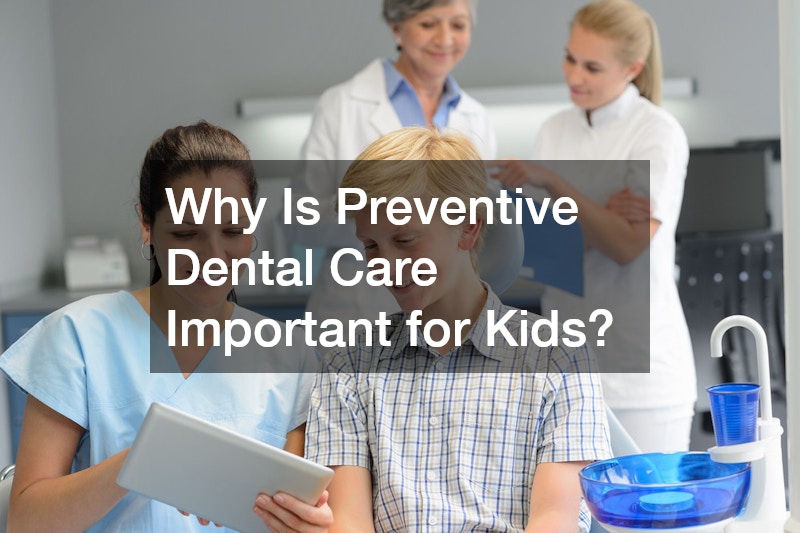
Preventive dental care is essential for maintaining the health of children's teeth and gums. Pediatric dentists, who specialize in caring for children’s dental needs, play a crucial role in this preventive approach. Many parents may wonder why it is necessary to prioritize dental care for their kids, especially at such a young age.
Video Source
However, the implications of neglecting oral health can be severe, leading to complications that affect overall well-being. By focusing on prevention, parents can ensure their children grow up with healthy smiles and good habits.
One of the most crucial steps in preventive dental care is scheduling early dental visits. Experts recommend that children visit a dentist by their first birthday or within six months of their first tooth erupting. These early visits allow dentists to monitor the development of teeth and jaws, ensuring everything is on track. During these visits, dentists can provide valuable guidance on proper oral hygiene practices, helping parents understand the best ways to care for their children's teeth. Early intervention can significantly reduce the likelihood of cavities and other complications later in life.
Moreover, early dental visits allow pediatric dentists to educate both parents and children about the importance of good eating habits. For example, habits such as frequent snacking on sugary foods can increase the risk of cavities, which can profoundly impact a child's health. Dentists are also able to detect any emerging orthodontic problems, such as overcrowding, misalignment, or spacing issues. Identifying these problems early can lead to more effective treatment options, which may help avoid extensive procedures in the future. By instilling these preventative measures from a young age, children are more likely to carry these habits into adulthood.
Preventive dental care is also about establishing healthy oral hygiene practices at home. Teaching children to brush their teeth at least twice a day helps remove plaque, the sticky film of bacteria that builds up on teeth. Dentists recommend using fluoride toothpaste, which strengthens tooth enamel and prevents decay. Parents should supervise young children during brushing to ensure they are using the correct technique and brushing for an adequate time. This routine becomes a vital part of children's daily lives, promoting self-care habits that can last a lifetime.
Flossing is another critical habit that should be encouraged early. While it may seem challenging, especially for young children, it is essential for removing food particles and plaque from between teeth. Dentists recommend starting flossing as soon as two adjacent teeth touch each other. With consistent practice and guidance from parents, children can learn to perform flossing effectively. Creating a fun and non-threatening atmosphere around oral hygiene can prevent children from viewing these habits as chores.
Regular dental check-ups are a cornerstone of preventive dental care for kids, offering several substantial benefits. During these appointments, dentists can conduct thorough examinations to identify potential issues before they worsen. This proactive approach allows for early treatment, which can save parents money and their children from discomfort. Regular visits also help instill a sense of routine around oral health, making dental care a priority for children. Developing this routine can lead to more consistent oral hygiene practices as they grow older.
Another benefit of regular dental check-ups is the ability to provide professional cleanings. Dental hygienists work alongside dentists to remove tartar build-up and polish teeth, ensuring that children maintain optimal dental health. This process not only helps to prevent cavities but also keeps children feeling fresh and confident about their smiles. Additionally, dentists can apply fluoride treatments and dental sealants during check-ups, further protecting children’s teeth from decay. The assurance of these professional services reinforces the idea that dental care is a vital part of overall health.
Lastly, consistent check-ups promote a positive outlook on dental care and diminish fears associated with visiting the dentist. When children experience a supportive, friendly environment, they are less likely to develop anxiety about dental visits. This positive experience encourages them to take ownership of their dental health and communicate any problems they may encounter. As a result, they learn the value of discussing dental concerns openly with caregivers and dental professionals. Overall, regular visits help cultivate a healthy attitude toward dental care that can influence their lifelong habits.
Preventive dental care is essential for children’s health. It encompasses early dental visits, healthy oral hygiene practices, and regular check-ups that lay the foundation for a lifetime of good dental health. By prioritizing these aspects, parents set their children on a path to lasting well-being. Pediatric dentists serve as key partners in this journey, providing valuable insights and treatment tailored to young patients. Investing in preventive care today reaps significant benefits in the future, fostering confidence and health in smiles that last a lifetime.
